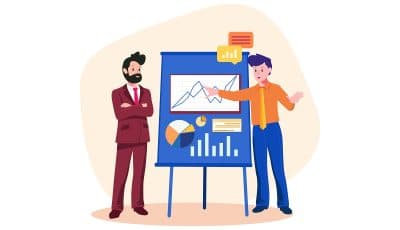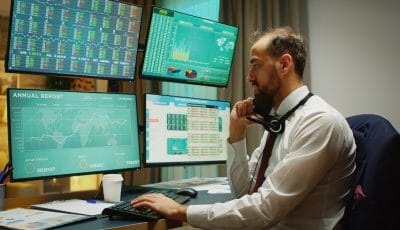
One of the most complex truths about trading and investing is that if you hope to become as consistently profitable as expert traders, you have to think and act like one BEFORE you can become one.
Aspiring traders should learn to mimic and follow the mental traits, belief systems, trading processes, and attitudes of successful predecessor traders and investors. Even though this may seem pretty obvious and sounds relatively easy to you, there is a reason very few people achieve trading success. If you want to start making money in the markets, you will need some knowledge and assistance with what you actually need to change and do. You can take help of the online trading course suitable to your requirements.
Most people ordinarily don’t like to consistently perform anything considered “boring” or “uncomfortable,” which is the major reason they fail at trading. For example, most people know what they should do regarding crucial things like health and fitness, but they choose not to do it, despite knowing the consequences.
We tend to ease off on our commitment to the discipline required to succeed when these “consequences” appear “far off” or “a long time away.” Thus, it would help if you kept these consequences in mind to prioritize doing what you need to do to achieve what you want.
So, What Does Consistently Profitable Traders Value?
- They value abundance and opportunity
The quickest way to lose all your money trading is by trading desperately and not being aware that you’re doing it.
What exactly is “trading desperately”?
The phrase is quite self-explanatory. Trading “desperately” basically means that you’re desperate to make as much money as you can, which, ironically, is what prevents traders from ever making money. Trading when your edge isn’t there, increasing your position size beyond what you’re comfortable losing, or deviating from your trading plan means you’re trading like you are “desperate” to make money. You must stop this if you want to think and trade like a millionaire.
Every consistently profitable trader operates from a mindset of wealth. They don’t feel desperate to make money. Not because they are millionaires, but because they see the infinite chances in the market and elsewhere in businesses. Hence, they don’t feel in a hurry to accept the next thing that comes their way. What they do instead is to wait patiently for the most obvious trade setup or maybe the lower risk opportunity to unfold.
Below is one of my favorite quotes that relate to not trading “desperately”:
This may sound like a cliché, but in truth, to become a successful trader, you’re going to have to start trading as if you’re already a professional. The mindset and habits of a losing trader (desperate to make money) will never translate into consistently making money in the markets. Suppose you have a $200 trading account. You will have to trade that account like someone NOT desperate to grow it hastily. Else, you WILL blow your account out quickly.
Consistently profitable traders value their performance in the market
- One of the biggest distinctions between a winning and losing trader is the performance of the former values, whereas the latter primarily values money. When you appreciate your trading performance in the market, you will focus on all the right things and develop the proper trading habits to make your performance stay positive.
- It is advisable that you don’t value only money when trading because you will forget about all the right things you need to do to enhance your performance. These things include having a trading plan, being disciplined and not over-trading or risking too much per trade, holding your traders longer, placing your stops further away, etc. You appreciate what you need to do to watch your equity curve go up consistently.
- It’s impossible to appreciate your trading performance and not value the proper processes and habits that let you watch your trading performance progress. However, when you only value the money, you can easily forget that it’s about SLOWLY making money over time and not just about “making money.” Attempting to make “fast money” always ends up in LOST MONEY.
Focus on performance, the trading “game,” and being good at it, not the money.
Consistently profitable traders value themselves and their abilities
For the most part, self-doubt helps nothing. Still, traders habitually stare a perfectly good price action signal in the face and do not take the trade because they’re afraid, for one reason or another. They doubt themselves and are not confident in their capacity to trade. Although, this is sometimes caused by not knowing your trading edge, which I can help with my professional online trading courses. Still, it’s often caused by overthinking.
You’re going to have to start thinking and acting more confident in your trading skills immediately. Like how confident players in life and business typically prevail, the same analogy applies in trading. This doesn’t mean that you should become an “outgoing prick.” The idea is to have some strong assurance in yourself and your abilities if you really desire to make money trading. Try to learn how to drop unpleasant, unattractive traits such as fear, insecurity, and hesitation because they are not good for relationships, business or trading and don’t attract people or money.
The quote below by the famous trading educator, Dr. Van K. Tharp, discusses how to build confidence in your trading. First, learn and study the markets, then adopt a superior trading strategy, and then practice it until you believe in it:
Side note: There’s a big difference between being a “confident” trader and a “cocky” trader. A cocky trader will take too many unreasonable risks. A confident trader will adhere to his plan and implement his trading strategies when he notices his signal present. He doesn’t hesitate but isn’t stupid and careless either. Hopefully, you see the difference.
I’ve written several lessons on trader psychology and behavior and the significance of having the proper trading mindset. Study my article on the psychology of forex trading to learn more.
How Do Consistently Profitable Traders Act?
Knowing how consistently profitable traders think about trading is only half of the equation. The other half is how they act in the market. You should know by now that it’s one thing to know something, and it’s a totally different thing to put it into action and DO IT. So, I want you to read this lesson without a “know it all” mentality, and I want you to put it into action in your trading.
Consistently profitable traders trade less than you.
Anyone who’s followed me, no matter how long or short, has possibly read one of my lessons on supply and demand trading, why you should do it, and how powerful it is. However, I would like to reiterate that end-of-day trading is how most consistently profitable traders trade. You may ask how I know this. It’s simple. There aren’t enough high-probability trading opportunities in the market every day, week, or month to let most traders day trade and become really successful at it.
Moreover, day-trading often stimulates people to trade too much, risk too much and do everything else wrong. I can’t say enough bad things about trading too frequently. But, if you don’t believe me, it’s only a matter of time before you find out through trial and error!
This quote by Jim Rogers is one of my all-time favorites on over-trading:
Consistently profitable traders control their risk carefully
One of the major keys to trading success is learning how to control position size. Having your position size in check will go a long way in calming your mind and placing you in the right trading mindset. A perfect example of HOW to trade from a wealth mindset and opportunity instead of desperation, as discussed earlier, is managing/controlling your position size. It’s important to maintain your position size at the dollar risk level that you know you’re okay with possibly losing per trade means you’re calm and okay with whatever the outcome may be. It also means that you are not trying to make “fast money”; you’re not desperate.
According to this quote by the fantastic trader Paul Tudor Jones, he opines that we should concentrate on defending our capital rather than “making money.” Concentrating on being a defensive trader tends to make everything else “fall into place.”
Conclusion
I want you to shut your eyes and imagine that you’re already where you want to be with your trading. You’re making steady money in the markets for a year, you have a plan you’ve followed to get here, and you are contented with your risk per trade. You have no problem with losses because you know that if you stick to the plan, the wins will ultimately make up for them and much more. I want you to do this exact exercise or something similar every time you sit down to look at the charts before turning on the computer. Every time.
Ultimately, we do what we think about the most, whether those thoughts are positive or negative, hurtful, or convenient for our goals. Hence, trading success, and so on, start in your head as thoughts. Be cautious of what you focus on when you think about trading because, honestly, “thoughts become things,” even though it might sound cliché. Ask yourself if you’re thinking about money and what you will buy with it, or if you’re thinking about your equity curve over time and how to become a more relaxed and self-controlled person.
Begin now to implement positive trading habits and effective trading strategies. Let your mind be filled with positive yet realistic outlooks about what is possible in the market and embark on a growth and self-discovery trading journey, and don’t ever look back.





